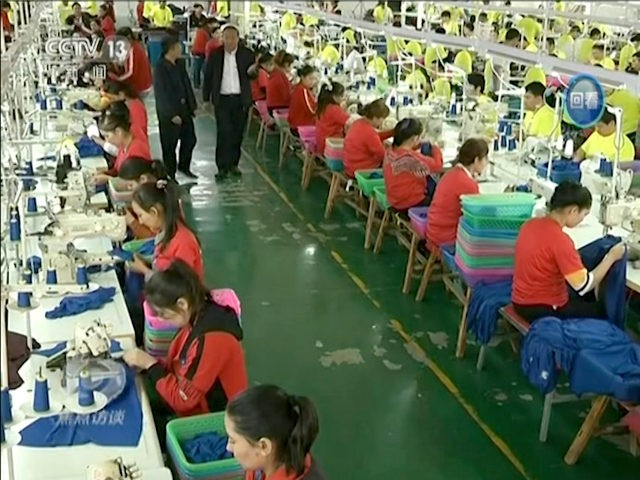Turkey’s state-run Anadolu news agency touted United States support in defending the rights of Chinese Uighur Muslims, noting Friday that America’s embassy in Ankara expressed solidarity with the country for challenging the Communist Party’s mass internment of the ethnic minority.
The U.S. State Department has long been the most vocal government entity in the world in defense of the rights of Uighurs, who are majority Muslims and live mainly in Xinjiang, China’s largest and westernmost province. State Department annual reports on global religious freedom were the first publications exposing Beijing’s construction of internment camps and arbitrary imprisonment of Uighurs, Kazakhs, Kyrgyz, and other Muslim minorities in the institutions.
Turkey’s high-profile praise from the United States for maintaining a consistent stance on human rights crimes against Uighurs arrives after a turbulent year in bilateral relations in which Turkey suffered significant economic consequences for its arbitrary arrest of U.S. citizen Andrew Brunson, arrested after decades of preaching Christianity in the country and ultimately freed to ease the sanctions. Turkey and the United States have also clashed on their respective foreign policies in Syria, where Turkey claims that the U.S.-allied Kurdish People’s Protection Units (YPG/YPJ) is a terrorist organization.
Turkey and the United States now appear aligned in an effort to pressure China to release the Uighurs from the camps, which China claims are “vocational centers” to teach marketable skills to undereducated minorities.
The Uighurs are a Turkic people and speak a Turkic language; Turkish officials have long identified the Uighurs as part of the larger Turkic ethnic family.
“The U.S. Embassy in Ankara joined Turkey on Friday in slamming China’s systematic assimilation policy towards Uighur Turks,” Anadolu Agency reported on Friday. The embassy issued a short statement confirming that it “agrees with [Turkey’s Foreign Ministry’s] assessment” of the situation in Xinjiang, where the internment camps are located, referring to an extended statement attributed to Foreign Ministry spokesman Omer Celik published Saturday calling the camps “a great shame for humanity.”
“It is no longer a secret that more than one million Uighur Turks incurring arbitrary arrests are subjected to torture and political brainwashing in internment camps and prisons. Uighurs who are not detained in these camps are under heavy pressure,” Celik wrote. “Our kinsmen and citizens of Uighur origin living abroad cannot get news from their relatives in the region. Thousands of children have been removed from their parents and became orphans.”
“The reintroduction of internment camps in the XXIst century and the policy of systematic assimilation against the Uighur Turks carried out by the authorities of China is a great shame for humanity,” the statement concluded.
In an article highlighting Turkey’s defense of the Uighurs last week, the U.S. diplomatic presence in Turkey noted that the United States has long been addressing the issue. Most recently, according to the article, Kelley Currie, the U.S. representative on the U.N. Economic and Social Council, delivered remarks dismissing China’s explanation of the camps as “vocational centers,” citing the personal stories of those who survived the camps.
On Thursday, the U.S. embassy in Ankara highlighted the story of Mihrigul Tursun, a young Uighur mother who survived the camps. Tursun has called the institutions “concentration camps,” accused Chinese police of killing one of her infant triplets, and testified to undergoing electroshock torture because she had visited the Middle East. Following her appearance to tell her story in Washington, DC, Chinese state media published a report claiming that Chinese nationals “laughed” at her story.
Turkey has been silent on Uighur repression for years, particularly since then-Prime Minister Recep Tayyip Erdogan accused China of “genocide” against the ethnic minority in 2009. Erdogan has since become president and expressed extreme interest in financial cooperation with Beijing and participation in its Belt and Road Initiative (BRI), a global infrastructure project intended to give China control of the world’s most valuable ports, roads, and railways. Turkey appears to have reversed its Uighur policy this weekend.
China responded by issuing a travel warning to Chinese citizens about traveling to Turkey and calling the Foreign Ministry “irresponsible” for its accusations.
The U.S. State Department regularly condemned China for its treatment of the ethnic minority in the years during which the Erdogan government remained silent. In its report on the situation in China for religious people in 2016, the State Department detailed repression of Muslims, Christians, and Buddhists to the benefit of the atheist Communist Party. China replied with a statement telling America to “mind its own business.”
A year later, the State Department published a report revealing that Communist Party officials in Xinjiang had begun the “disappearance, jailing, or forced attendance at re-education classes of tens of thousands of Uighurs and other Muslim minorities.” The State Department was the first to reveal that up to two million western Muslims in China are being held in the internment camps.

COMMENTS
Please let us know if you're having issues with commenting.